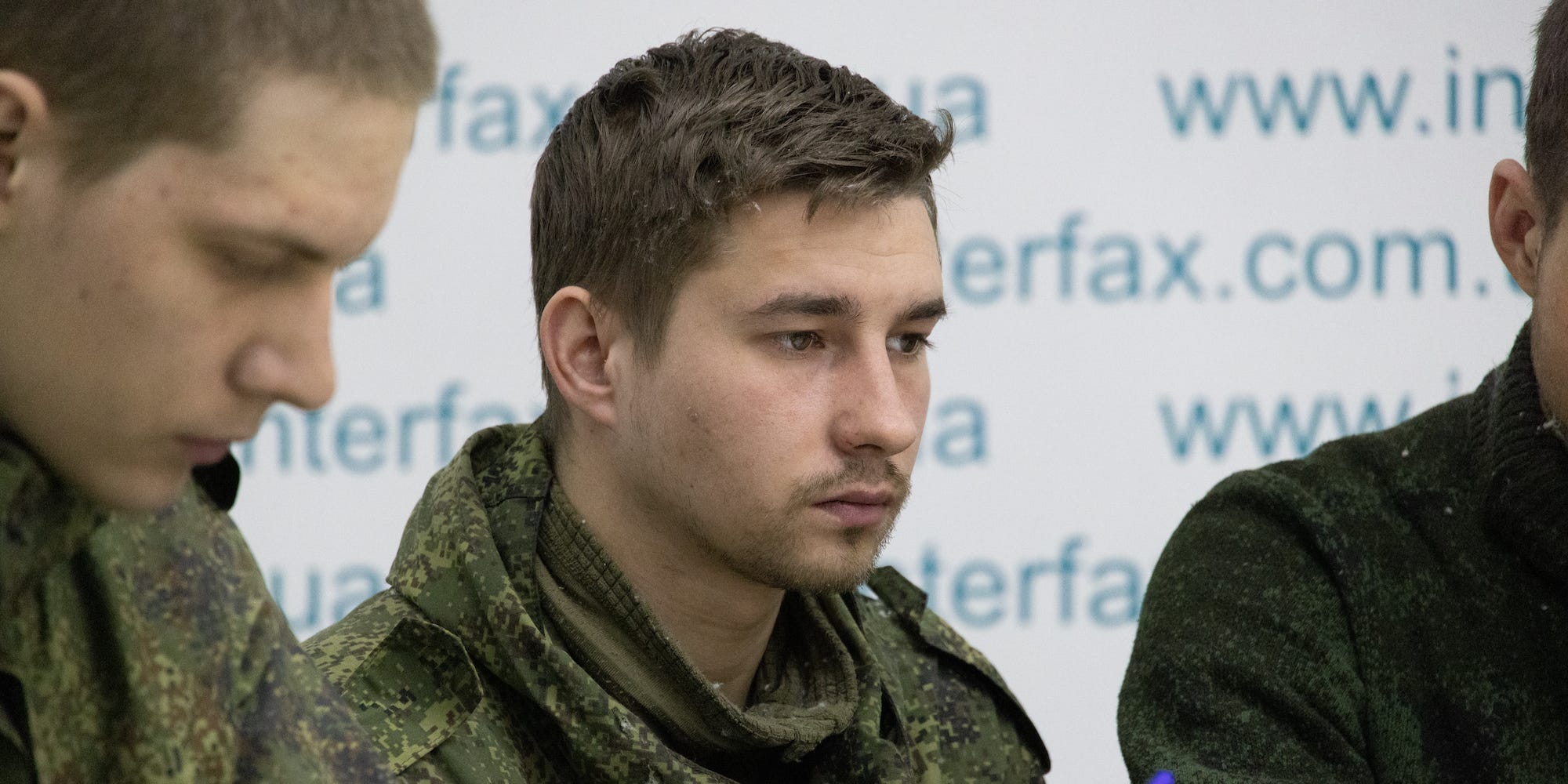
- Captured Russian soldiers said they were misled about the purpose of the Ukraine war, per the NYT.
- A Russian lieutenant said he didn't know about the invasion until the night before, the paper reported.
- It matches several unconfirmed reports that many Russian soldiers were duped into fighting.
Russian soldiers carrying out the invasion of Ukraine were not told they were going to war, and were lied to about what they would face, according to an increasing number of firsthand accounts.
One was a captured Russian lieutenant, who said on Saturday that he only learned his country would invade Ukraine the night before being sent in, The New York Times reported.
In statements given to a Ukrainian news agency, Lt Kovalensky said that lower-ranking soldiers were kept in the dark about planes to attack.
Per the Times, Kovalensky "learned Russia would invade Ukraine only the evening before the tank columns began moving, and that soldiers at the rank of sergeant and lower were not told where they were driving until after crossing the border."
Another captured Russian fighter, Lt. Col. Astakhov Dmitry Mikhailovich, condemned his commanders in a video published by the Ukrainian news agency UNIAN.
Mikhailovich said his men had been duped into believing they were rescuing the country from Nazis, and were surprised to be met with a fight.
—Jackie Singh 🇺🇦 🇺🇸 (@hackingbutlegal) March 6, 2022
It's unclear whether the statements were given under duress. But such accounts are increasingly common, and they match tentative assessments from western experts that give an emerging picture of a rank-and-file taken by surprise — and demoralized — by its own attack.
An unnamed senior US defense official told Voice of America on March 1 that many of the Russian side are conscripts with no experience of real fighting.
"Some of them weren't even told they were gonna be in combat," he said, per VOA.
Ben Wallace, the UK's defense secretary, said much the same to BBC radio on March 2.
"We've seen a number of anecdotal reports by young Russian soldiers saying, didn't even know I was here, I thought I was on exercises, no one told me I was going to war, no one told me I was going to kill Ukrainians,'" he said.
A sense of moral purpose is essential, Wallace said. "So there's huge amounts of low morale in the Russian forces," he said.
At a striking presentation last week at the United Nations, Ukraine's ambassador presented a text message exchange he said was between a Russian soldier and his mother before he was killed.
In the texts, the unnamed soldier appeared to inform his mother that he was not really on a training mission and had instead been deployed into a "real war"
"We were told that they would welcome us," the the exchange said," but instead the locals were "falling under our armored vehicles, throwing themselves under the wheels and not allowing us to pass."
"They call us fascists," the texts continued. "Mama, this is so hard."
—CSPAN (@cspan) February 28, 2022
Accounts of ignorance of the impending invasion within the armed forces track with those from elsewhere in the Russian state.
An account published by Russian investigative journalists last week said that Kremlin staff had been preparing for a far more limited confrontation, and were shocked when it became clear Russia had started a war.
Locals in Ukraine have also spoken of the bewildered Russians attacking them.
Artem Mazhulin, a 31-year-old from Kharkiv told The Guardian: "Some of them thought they were on military exercises. They didn't anticipate resistance."
The Guardian also reported similar sentiments given by captured Russian soldiers. It noted, however, that the statements appeared coerced, making them difficult to take at face value.
A former Ukrainian military adviser, Alex Kovzhun, described how Putin's propaganda filtered through to soldiers, telling the paper they "were told Ukrainians were imprisoned by mythic Nazis."
A number of videos have also emerged of abandoned Russian military vehicles, which reports suggested had been abandoned by despondent Russians. Insider was unable to independently verify the videos.
On March 2, The Wall Street Journal cited a Ukrainian colonel, whom it did not name, as saying soldiers in the miles-long column attempting to reach Kyiv were "hungry, without fuel, demoralized."
Despite a seeming problem with morale, and slow progress in its invasion, Russia still had many advantages.
It commands a vastly larger army than Ukraine's and has demonstrated a historic indifference to collateral damage.
Secretary of State Anthony Blinken told CNN Sunday he had seen "very credible reports of deliberate attacks on civilians."
Dit artikel is oorspronkelijk verschenen op z24.nl
